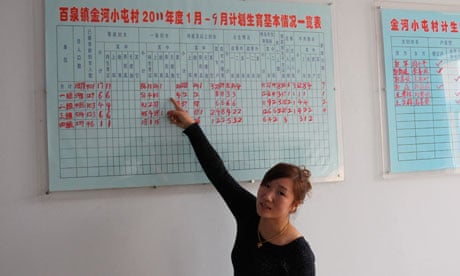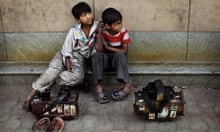Family planning in Xiaotun village is deemed a success. Its population of 1,871 people increased by only 10 last year, or less than 0.5%.
The progress towards stabilisation is marked in red pen on a white board at the Xiaotun village family planning centre. It notes that 401 of the 1,871 residents are married women of child-bearing age. Of them, 156 have one child and 228 have two or more. A further column shows the measures that have been taken to prevent further births. A total of 228 are in this category. Only four are using contraception. The other 224 have been sterilised, a remarkably high proportion.
Hu Ruiling, director in charge of women, acknowledged a considerable degree of intrusiveness. "We check every women in the village each month," she says. "If we find someone is pregnant with a second child, we suggest abortion."
But reports from other provinces reveal the sinister methods used by officials to reach their family planning targets.
This month, a woman in Lijin, Shandong, died during a forced abortion on her seven-month foetus. It would have been Ma Jihong's third child. Relatives told the Guardian that 10 men turned up at Ma's home, forced her to go to the hospital and pressed her fingerprint to an authorisation form for the abortion. The operation went horribly wrong, but the relatives were not told for hours that she had died. "Her eyes were black and her nose was bloodied," said the relative. "We know we lost the mother. We have no idea what happened to the child."
Li Heping, a lawyer who has represented victims of similar cases, said this is certainly not the first death. "It's wrong to use violence to enforce the policy. It goes against human nature and tradition. But it happens everywhere in China."
Instead of punishing murderously zealous local officials, the authorities have tried to silence the lawyers, activists and individuals who try to complain. In one of the most egregious of modern China's injustices, the blind civil rights activist and lawyer Chen Guangcheng was imprisoned for three years after he tried to alert the health ministry to the abductions and forced abortions carried out by family planning officials in Linyi, Shandong province. He has been released but remains under extra-legal house detention. Lawyers and journalists who try to visit have been beaten up by thugs employed by the government.
The heavy-handed tactics and coercion by officials have turned one-time champions against the policy. Liang Zhongtang, of the Shanghai Academy of Social Science, was one of its earliest and most influential advocates, but he now thinks it is ineffectual and wrong.
Many rural people have ignored the rules. And Thailand, by contrast, has achieved a sharper drop in its fertility rate over the same period without such tough measures.
More important, though, are his ethical concerns. "I realised that what we did was not right. It infringes people's rights. Births are a matter than should be decided by individuals and families, not the government. We should halt the policy immediately."





